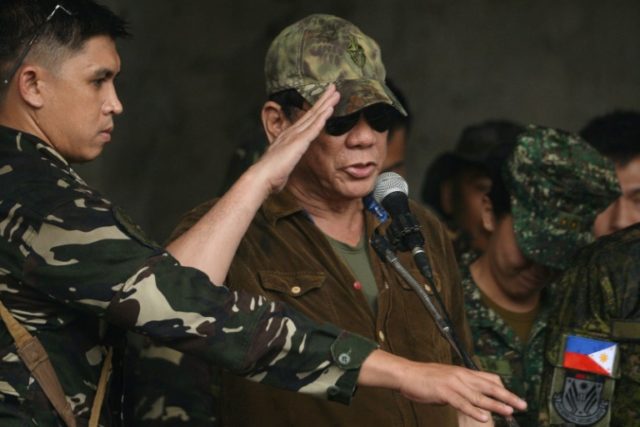Defense Secretary Delfin Lorenzana of the Philippines announced Friday that his government would launch a complete review of the 1951 mutual defense treaty signed with the United States, aimed at deciding whether to “maintain it, strengthen it, or scrap it.”
The treaty forces both parties to take military action if one of them suffered an invasion or attack, treating an attack on one country as an attack on both. It also requires the nations to engage the United Nations Security Council immediately in light of any conflicts and to periodically review the treaty for potential improvements.
Lorenzana did not hint at Manila walking out of the treaty, but his announcement follows months of President Rodrigo Duterte attempting to bring his country closer to China and Russia and move away from the United States, prompting some concern that his administration is interested in canceling the treaty. Since the treaty requires U.S. military action should any other nation invade the Philippines, ending the treaty greatly reduces the risks of attacking that country.
The Philippines is currently involved in a territorial dispute with China over the South China Sea. Beijing has spent much of the past decade building and equipping military facilities in the Spratly Islands, which belong to the Philippines, illegally. In 2016, the Permanent Court of Arbitration at the Hague ruled in favor of Manila in the case Philippines v. China, finding all of China’s claims in the South China Sea illegal.
“We have to look at dispassionately without considering past ties, future ties,” Lorenzana told reporters on Friday, claiming he had initially only brought up the treaty “because I was asked if it’s time to review. I said perhaps, because this was done in 1951.”
“We’re not saying we’ll strengthen it so that they will help us if there is a fight. Who are we fighting? Are we hoping someone will attack us here in the Philippines? I don’t think so. I don’t think we have an enemy that would take over our country,” Lorenzana continued, adding that another consideration for the treaty is the end of the Cold War and how that has reshaped national security threats for the Philippines since 1951.
American officials responded to the remarks with little concern.
“We have a strong and robust security alliance with the Philippines, and the United States by its mutual defense treaty obligations,” said Trude Raizen, the acting press attache at the U.S. Embassy in Manila, told reporters on Friday. Raizen went on to call the relationship between the Philippines and the United States “ironclad,” asserting there was little concern that Duterte would break off all ties with Washington.
Al Arabiya, a Saudi news agency, reported on Thursday that Philippine Foreign Affairs Secretary Teodoro Locsin is seeking further conversations with his American analog, Secretary of State Mike Pompeo, in light of growing Chinese military activity in the Spratly Islands. The publication suggested that a review of the 1951 treaty did not necessarily have to end with a weaker agreement, but may, in fact, be an attempt to find ways to expand the U.S. presence in the area to intimidate China further. At the time the countries signed the agreement, Japan and Russia were much more present threats to the United States than China.
The text of the 1951 Mutual Defense Treaty makes clear the obligation of military action on both sides.
“Each Party recognizes that an armed attack in the Pacific Area on either of the Parties would be dangerous to its own peace and safety and declares that it would act to meet the common dangers in accordance with its constitutional processes,” the treaty reads. “[A]n armed attack on either of the Parties is deemed to include an armed attack on the metropolitan territory of either of the Parties, or on the island territories under its jurisdiction in the Pacific or on its armed forces, public vessels or aircraft in the Pacific.”
Since taking office in 2016, Duterte has repeatedly stated he wishes to establish closer ties with China and other Asian nations, not faraway countries like the United States. He reportedly intervened to prevent Philippine Navy ships from enforcing the 2016 Hague ruling and warned officially to “not be overly, what they call overly celebrating because we might offend China so that’s what happened,” according to Lorenzana last month. Duterte, he added, was exceedingly concerned about “we might offend China.”
Duterte’s pivot has failed to gain speed in large part because the people of the Philippines largely trust the United States more than China and, polls show, disapprove of his foreign policy shift away from Washington. A survey taken in July found that over 70 percent of Filipinos wanted the government to take a more aggressive stance against China in the South China Sea, expanding its naval presence there. By November, the number of Philippine respondents rejecting Duterte’s friendliness towards China increased to 84 percent.

COMMENTS
Please let us know if you're having issues with commenting.